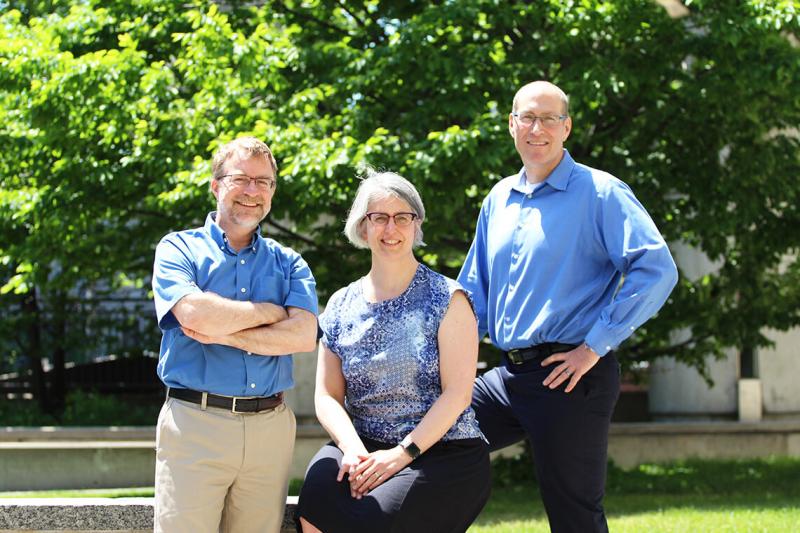June 27, 2018 | Alumni
Alum Michael McCarthy helps U of T computer science introduce new tech leadership initiative
By Nina Haikara

Paul Gries and Karen Reid, associate professors, teaching stream, and computer science alumnus and Executive In Residence Michael McCarthy (BSc 1994 SMC, BA 1999 SMC) are launching a new technology leadership initiative (photo by Ryan Perez)
In business and research, leaders help motivate others to navigate a clear path forward. To help prepare future computer scientists for these roles, University of Toronto’s department of computer science is inviting undergraduates entering the second-year of the major or specialist program to apply for the technology leadership initiative.
“Leadership skills are essential for our undergraduates, regardless of their future involvement in large corporations, entrepreneurial companies, private labs, or academic institutions,” says Ravin Balakrishnan, who is a professor and department chair. “This initiative prepares students to make a significant impact, regardless of the career path they choose.”
The cohort will be enrolled in dedicated sections of two core courses: Software Design (CSC207) and Software Tools and Systems Programming (CSC209).
“These two CSC offerings will be tailored to include real-world problems with the support of industry partners,” says Karen Reid, an associate professor, teaching stream, of computer science.
“It gives us a new opportunity to exchange knowledge between industry and the university, and it’s a chance for students early in their program to be exposed to industry ideas.”
U of T computer science alumnus Michael McCarthy (BSc 1994 SMC, BA 1994 SMC) is helping co-ordinate the initiative as the department’s executive in residence. Passionate about leadership, McCarthy has a master of business administration and has held the role of CEO at several software companies.
“By crossing the divide between technology and business operations, I was able to add significant value to organizations”
“I grew up in an era in which technology was a little isolated from the way that most businesses operated,” he says. “By crossing that divide, I was able to add significant value to organizations with which I was working. Effective leadership requires both a strategic vision and the tools to motivate others to get there.”
McCarthy says technology leadership students will learn more deeply about industry trends and develop skills that will allow them to negotiate and build business cases, as well as navigate the complexity of modern organizations, in order to achieve results. It’s also important that they develop who they are as leaders, he says.
“Whether you're going into industry or research, having competence with respect to asking the right questions and driving results is still something that's always relevant,” he says.
“The U of T program has extraordinary expertise in developing some of the best specialists that are out there. For students also interested in creating impact by driving business value or expanding research horizons, this initiative is a great way to augment learning.”
In addition to the course material, students will be required to spend five hours each week outside of class attending leadership workshops, networking events and company site visits, among other activities. Each future technology leader will also be placed in a summer internship at one of the partner companies.
"There's nothing that prepares you for the actual sport better than playing the game," McCarthy says.

